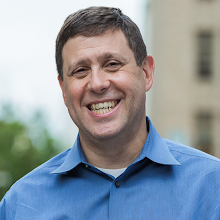The leaders of the Democratic Party (Dean, Reid, Pelosi) are calling for a more radical tack, a major course correction that may achieve the short term goal of bringing the soldiers home and saving American lives, but won't do much for bringing stability to the Middle East. It is still undetermined if the current course will achieve the latter goal, but at this point in time, I am not sure we have much choice but to stick to the new current goal. The events of the past 4 years, have blown the US past its original mark, and to beat back downwind to achieve these past goals, may no longer be realistic. As an unfortunate as this might seem we must do everything to be sure that our withdrawal does not lead to full-scale Iraqi civil war or allow another Middle East dictatorship to gain a foothold in Iraq.
So, that leads into the main point from today's news. The President has admitted that he authorized various government agencies to perform domestic surveillance on American citizens and bypassed standard legal procedures in the process.
The President says: "Eavesdropping Has Disrupted the Enemy"
(He) said he has the constitutional authority to Approve eavesdropping on American citizens and foreign nationals in the U.S. to protect Americans from the threat of terrorism.His attorney general has also said nothing was done wrong: Gonzales defends eavesdropping program:
``To save American lives we must be able to act fast,'' the president said in a news conference at the White House. The surveillance ``has been effective in disrupting the enemy.''
It derived its legality from the congressional resolution permitting the use of force to fight terrorism in the wake of September 11, 2001 as well as from the "inherent powers" of the president as commander in chief.Finally Bush in his invite wisdom believes he has done nothing wrong and would do it all again: Bush vows more eavesdropping
He acknowledged that such eavesdropping would be illegal under the Foreign Intelligence Surveillance Act (FISA). But that act, he said, makes an exception for eavesdropping when "otherwise authorized" by statute. That authorizing statute, he argued, was the 2001 resolution, known as the "Authorization to use Military Force."
That resolution makes no reference to eavesdropping or detention policies. The administration has cited it in justification of both, however.
Bush vowed on Monday to authorize more eavesdropping on Americans suspected of ties to terrorists and said he believed a probe was underway into who committed "the shameful act" of revealing the covert program.This whole situation is appalling. As I was discussing this today with a southern (red state) friend, she was saying that it is ok to give up some personal freedoms in order to protect the country and help prevent another terrorist attack here in the United States. I fundamentally disagree with this attitude, and this concept has far reaching ramifications. The reports say that at any time 500 hundred US citizens may have been watched by the government, and some people have come and gone off the list. The speculation is that up to 1000 persons have been monitored under this presidential edict in some capacity over the past 4 years. Now lets assume that they have been constantly monitoring 400 people and the another 600 have passed through the system and have been spit out for unknown reasons. That means that potentially only 40% of those US citizens being wiretapped illegally might actually be really bad guys, doing bad stuff. What is happening with the information that was gathered on the other people? Is this the 1950's red-baiting and black listing all over again? It certainly seems like it is a possibility.
The largest concern is why they cannot simply comply with the law in order to perform these activities. We have essentially overlooked the whole prisoner of war issue at Guantanamo, and given the government free reign on these non-citizens, but what happens when the surveillance extends beyond terrorist activites, and other information, illegal or other, is uncovered from this eavesdropping? Will wives be able to subpeona the government records to determine if their husbands are cheating on them? What else? Who knows? This is exactly why this type of action needs to be closely monitored and curtailed with strict time limits and scope of what the government may look for, and what they do with peripheral data captured on citizens not associated with those under surveillance?
Laws are created to help prevent this country from becoming a dictatorship, a police state or anything other than an evolving representational republic, which it has been for the past 230 years or so. If we allow individual rights to be curtailed for the greater good then it is only a matter of time until the entire muslim community comes under attack, then the Jews, then the gays, then the Catholics, before we know this country has become another Nazi Germany or Stalinist Russia. This might seem like a farfetched scenario, but all it takes is public apathy and acceptance of this behavior by our elected leaders and it becomes a downward spiral from there.
In times of war, the public needs to sacrifice some liberties, but only for a limited time, it is unfortunate but often necessary for the common good. None other than Abraham Lincoln chose to suspend some civil rights and suspend habeas corpus during the Civil War, but the difference is they were intended to be short term, not permanent. These cavalier statements from the commander in chief, are concerning because he and his cronies see no reason to put time limits on these and also no reason to stop this illegal activity.
For instance the NYPD began publicly searching bag before you get on the train this past summer. This is not a problem in my libertarian world, because they are protecting a public interest (transportation) and this gives me the option to either 1) not take the subway or 2) take the subway and take the chance that you will be searched. This seems like more of a show, then actually detering terrorists, but hey it looks good and makes for a good example. However, the NYPD is not monitoring my email, my snail mail or my phone, and if they have reasonable cause to believe that I am doing something "Bad" they need to go to a judge and justify their proof to obtain a warrant to monitor my behavior and actions. The President and the federal government should have to also, no exceptions!!
It is almost scary how closely this administration is beginning to mirror the second term of the Nixon administration. Even the supporters of this policy say that this is not like the 1970's since these are truly enemies of the state and not simply enemies of the president. However, what is preventing the government from extending the "executive priveledge" to other law abiding US citizens? The supporters of these actions claim that this behavior will help capture the next Osama Bin Laden or Mohammad Atta before they strike against the homeland again. Unfortunately the only US born domestic terrorist I am aware of is Timothy McVeigh, and it just begs the question of what if anything is President Bush doing to protect us from this a real internal terrorist?









No comments:
Post a Comment